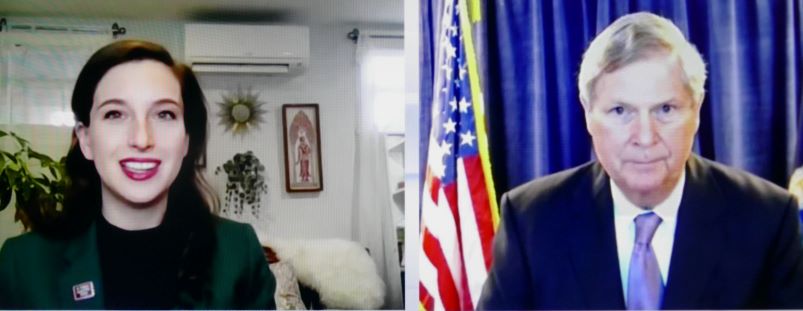Vilsack evaluates array of programs in reprise as Ag Secretary
Agriculture Secretary Tom Vilsack, back at his old job, said Friday, March 26, his department is reviewing its vast array of programs such as food stamps, the pittance of aid that goes to Black farmers and nutrition for adults, as well as exploring how to help “our kids to eat better.”
“What is working?” he asked at one point, or another time, “It bears asking the question.” Repeatedly naming programs, including the whole food production-processing system – and government’s role -- to be examined, Vilsack occasionally blamed the coronavirus pandemic for shortcomings but not once did he mention the Trump administration.
Speaking at a National Press Club virtual Headliner event from Iowa, Vilsack laid out policies and programs that went far beyond the days when the USDA loosely regulated farmers who plowed their fields, sewed and cultivated seed and eventually harvested their crops and hauled them to market.

Vilsack’s own life is a metaphor of those changes.
An orphan, he was born and schooled in the East and wound up in Iowa, where he quickly became mayor of his wife’s hometown of Mount Pleasant. He went on to become governor and served as agriculture secretary during the entire Obama administration.
Vilsack campaigned for Joe Biden’s unsuccessful candidacy in 2008, and 12 years later President Biden repaid him with a nomination to a second run as agriculture secretary.
“We pay very very little for the food that we consume,” Vilsack said. “The margin is very small…. Are we willing to pay just a little bit more for a more resilient, more competitive, safer system? Or is government able to provide those resources so consumers don’t pay more and (the government) is more supportive?” But, he added, “there are rules and regulations.”
Children and nutrition
If Vilsack focused on one issue, it was children and nutrition.
The agency is reviewing whether to make permanent the $100 a month, 15 percent increase in food stamps (SNAP). He also said “far too few” take advantage of the government’s women, infants and children (WIC) program. He said the pandemic has shut down school lunch programs that many families depended on to help feed their children.
“Our children’s nutrition and education are every bit as important as any weapon being developed in this country,” he said.” I’d like our kids to eat better.”
Adults, too, he said, must improve their diets, adding that 18 percent of all children and 70 percent of adults are overweight. By dealing with the problem, “we could cut the number of diabetics in half.”
He said that some research shows the average family spends an hour and a half each day preparing meals from scratch and eats 20 pounds of beans a week.
“I don’t think that’s happening today,” he said. But he asked again: “What’s the situation today? The cost? The benefits?”
Support for Black farmers
The agency is undertaking “an internal review” of the vast disparity between government support for Black farmers compared to White farmers, Vilsack said. Black farmers receive only $20 million in federal aid, while white farmers receive $5 billion.
“How do we begin the process that responds to the cumulative effect of discrimination … to identify where the serious systemic problems are and to root them out?” Vilsack said.
Vilsack said the development of more, better and new markets would make the small and middle-size farmer more competitive .As an example, he said during the shutdown of several packing plants in Iowa during the pandemic, hog raisers couldn’t deliver their hogs to market on time and quickly the hogs’ size changed and affected their marketability,.
When Club Membership Secretary Emily Wilkins asked in her final question what would be the top agriculture priority Vilsack would want included in the upcoming infrastructure legislative package, he declined to choose.
"I can't give you one," Vilsack said. "And that's the beauty of the Department of Agriculture. We can't afford to concentrate on one issue. We have to do them all, and we have to do them all equitably in this day and age."
